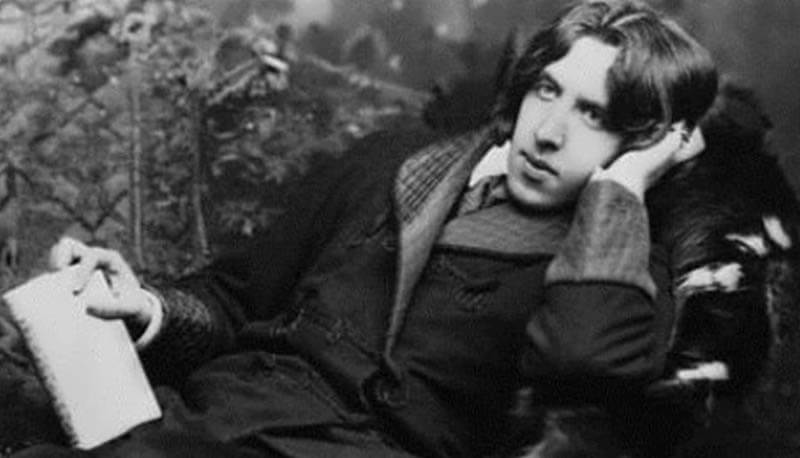Concetti Chiave
- Oscar Wilde, a key figure in the aesthetic movement, was influenced by Walter Pater during his time at Magdalen College, Oxford.
- Wilde gained initial notoriety through public appearances and aesthetic prose but later focused on his wit to appeal to the public.
- His literary work includes tales like "The Happy Prince", the novel "The Picture of Dorian Gray", and the drama "Salomé".
- Wilde is renowned for his comedies that satirize London society, such as "The Importance of Being Earnest" and "An Ideal Husband".
- Following a legal scandal, Wilde was imprisoned, leading to significant works like "The Ballad of Reading Gaol" and "De Profundis".
(Dublin 1854 - Paris 1900). The aesthetic movement reached its culmination with Oscar Wilde. From his years at Magdalen College, Oxford, he had been influenced by the doctrines of Walter Pater. In 1881 he published his first volume of Poems at his own expense. To secure notoriety and thus increase the sale, he adopted an aesthetic prose, making public appearences in silk knee breeches and with a carnation in his hand.
La carriera letteraria di Wilde
Soon, however, he gave up this form of self-advertisement, and tried to win the public by the brillance of his wit rather than by the extravagance of his attitudes. Having taken to journalistic work to make a living, he wrote, at the same time, delightful tales collected under the titles of "The Happy Prince and Other Stories" (1888) and "A House of Pomegranates" (1891), sophisticated novels such as "The Picture of Dorian Gray" (1891), essays on art, published in one volume as "Intentions" (1891), and an erotic drama in French, "Salomé" (1893).
But he showed his sparkling wit principally in a series of comedies, dealing sarcastically with the London society, "Lady Windermere's Fan" (acted 1892), "A Woman of No Importance" (acted 1893), "The Importance of Being Earnest" (acted 1895) and "An Ideal Husband" (acted 1895).
Il declino e la prigionia
Then he instituted a legal action against the Marquis of Queensbury who had accused him of homosexuality.  Wilde was at the heigh of his fame for his brillant plays. The accusation was well grounded and Wilde was sentenced to two years of hard labour at Reading Gaol (1895-1897). His imprisonment was a disaster for the theatre in which he had made such a brillant start, but the sense of social disgrace, and the trying perioid he spent in jail, gave his emotional depth and allowed him to produce "The Ballad of Reading Gaol", a poem of poignant intensity, and "De Profundis" (1895), an apology of his life. His last years were cheerless and unproductive. He wandered in France and Italy, and died on 30 November, 1900.
Wilde was at the heigh of his fame for his brillant plays. The accusation was well grounded and Wilde was sentenced to two years of hard labour at Reading Gaol (1895-1897). His imprisonment was a disaster for the theatre in which he had made such a brillant start, but the sense of social disgrace, and the trying perioid he spent in jail, gave his emotional depth and allowed him to produce "The Ballad of Reading Gaol", a poem of poignant intensity, and "De Profundis" (1895), an apology of his life. His last years were cheerless and unproductive. He wandered in France and Italy, and died on 30 November, 1900.
Domande da interrogazione
- ¿Cómo influyó Oscar Wilde en el movimiento estético?
- ¿Cuáles son algunas de las obras más destacadas de Oscar Wilde?
- ¿Qué impacto tuvo la acusación de homosexualidad en la vida de Oscar Wilde?
Oscar Wilde llevó el movimiento estético a su culminación, influenciado por las doctrinas de Walter Pater, y utilizó su ingenio brillante para ganar notoriedad.
Entre sus obras más destacadas se encuentran "The Picture of Dorian Gray", "The Importance of Being Earnest", y "The Ballad of Reading Gaol", entre otras.
La acusación de homosexualidad llevó a Wilde a ser condenado a dos años de trabajos forzados, lo que afectó su carrera teatral y le inspiró a escribir obras como "The Ballad of Reading Gaol" y "De Profundis".






 Accedi a tutti gli appunti
Accedi a tutti gli appunti
 Tutor AI: studia meglio e in meno tempo
Tutor AI: studia meglio e in meno tempo